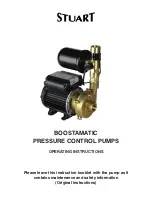
7
7
3.
Make sure guards are in place and in proper working order before operating
machinery.
4.
Remove any adjusting tools.
Before operating the machine, make sure any adjusting tools
have been removed.
5.
Keep work area clean.
Cluttered areas invite injuries.
6.
Overloading machine.
By overloading the machine you may cause injury from flying parts.
DO NOT
exceed the specified machine capacities.
7.
Do not force tool.
Your machine will do a better and safer job if used as intended.
DO NOT
use inappropriate attachments in an attempt to exceed the machines rated capacity.
8.
Use the right tool for the job.
DO NOT
attempt to force a small tool or attachment to do the
work of a large industrial tool.
DO NOT
use a tool for a purpose for which it was not
intended.
9.
Dress appropriate.
DO NOT
wear loose fitting clothing or jewelry as they can be caught in
moving machine parts. Protective clothing and steel toe shoes are recommended when
using machinery. Wear a restrictive hair covering to contain long hair.
10.
Use eye and ear protection
. Always wear ISO approved impact safety goggles. Wear a full-
face shield if you are producing metal filings.
11.
Do not overreach
. Maintain proper footing and balance at all times.
DO NOT
reach over or
across a running machine.
12.
Stay alert
. Watch what you are doing and use common sense.
DO NOT
operate any tool or
machine when you are tired.
13.
Check for damaged parts
. Before using any tool or machine, carefully check any part that
appears damaged. Check for alignment and binding of moving parts that may affect proper
machine operation.
14.
Observe work area conditions
.
DO NOT
use machines or power tools in damp or wet
locations. Do not expose to rain. Keep work area well lighted.
DO NOT
use electrically
powered tools in the presence of flammable gases or liquids.
15.
DO NOT operate machine if under the influence of alcohol or drugs
. Read warning
labels on prescriptions. If there is any doubt,
DO NOT
operate the machine.
16.
DO NOT
touch live electrical components or parts.
17. Be sure all equipment is properly installed and grounded according to national, state, and
local codes.
18. Keep all cords dry and free from grease and oil.
19. Inspect power and control cables periodically. Replace if damaged or bare wires are
exposed.
Bare wiring can kill!
20. Keep visitors a safe distance from the work area.










































